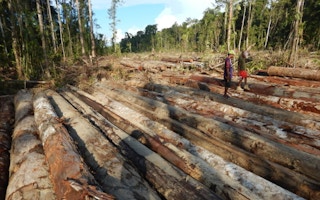A report released on Tuesday by London-based NGO Global Witness has prompted major US retailers to discontinue sales of exotic wood flooring linked to illegal logging in the tropical forests of Papua New Guinea (PNG).
Global Witness reports that an investigation into the 9,000-mile-long chain of custody that timber travels on its way from PNG to Chinese factories and ultimately store shelves in the United States determined that as much as one-third of the wood exports coming from the South Pacific nation in recent years was produced by clear-cutting rainforest concessions that local communities say were granted to logging companies in violation of their rights under PNG law.
“Papua New Guinea’s government has illegally handed over vast tracts of indigenous land to logging companies, who are gutting virgin rainforests at breakneck speed,” Global Witness campaign leader Rick Jacobsen said in a statement. “Responsible companies should not be dealing in this wood.”
The majority of timber produced in PNG is shipped to China and turned into flooring, furniture, and plywood, among other products, though smaller amounts of PNG timber are sent to countries like India, Japan, South Korea, and Vietnam. Much of the hardwood flooring produced in China is sold domestically, but the US buys $15 billion-worth of wood products from China every year, more than any other country.
“
Papua New Guinea’s government has illegally handed over vast tracts of indigenous land to logging companies, who are gutting virgin rainforests at breakneck speed.
Rick Jacobsen, campaign leader, Global Witness
The report authors write: “Our investigation found that certain American and Chinese companies were selling this flooring without taking the necessary steps to ensure it was legal, despite a US ban on the trade in illegal timber under the Lacey Act,” a law originally passed in the year 1900 to halt the illegal wildlife trade and amended in 2008 to ban the trade in illegally produced wood and plant products.
When confronted with the findings of the Global Witness report in April 2017, Home Legend, a company that supplies US retailer The Home Depot, decided to stop selling taun flooring products effective immediately and said it would review its sourcing policies, according to the Global Witness report. Taun is one of the most common hardwood species exported from PNG.
Home Legend told Global Witness that it had all the documentation required under the Lacey Act to prove the provenance of the wood it was buying from Chinese suppliers, but that the “information and detailed research” provided by the group had “brought the logging practices of Papua New Guinea and Solomon Islands into question.”
Home Legend also told Global Witness that it had “received agreement from Home Depot to discontinue this sku [stock keeping unit] and pull all the samples from the stores.” Home Depot’s taun-based hardwood flooring product is currently marked as “discontinued” on the company’s website.
Global Witness says it sent letters in March of this year to ten US companies in total who were found to be selling taun flooring. Nature Flooring Industries, Inc., a US subsidiary of Nature Home, one of China’s largest flooring retailers, said it would halt all procurement of flooring made with wood from PNG and review its sourcing policies and procedures. Two companies said their taun flooring was sourced from Indonesia, and the rest did not respond.
Two years ago, Lumber Liquidators became the first major US corporation to be found guilty of violating the Lacey Actsince it was amended in 2008. A 2015 analysis by the Union of Concerned Scientists found that illegal wood imports into the US have declined significantly — between 32 and 44 per cent — since the Lacey Act amendments went into effect, but that companies were still importing as much as $3 billion-worth of illegal wood into the US every year.
No evidence of free, prior, informed consent from locals
Under PNG’s constitution, the country’s citizens are guaranteed legal ownership over land they have traditionally lived on and used. But as of 2011, more than 12 percent of this land had been granted to companies as agricultural concessions, known as Special Agriculture and Business Leases (SABLs), according to Global Witness.
“Roughly one out of every ten tropical logs entering the Chinese market in recent years came from an SABL,” according to the report. “Unlike the US and Europe, China does not have a law banning the import of illegal timber, making it a conduit for wood from high risk countries like PNG.”
PNG Prime Minister Peter O’Neill’s administration has promised to cancel the illegal leases, Global Witness notes, but has yet to follow through on that commitment. The PNG government did not respond to requests for comment.
Paul Pavol is a landowner in PNG who was awarded the Alexander Soros Foundation’s Award for Environmental and Human Rights Activism last year for his efforts to protect his forests from logging. He told Global Witness that the lease the PNG government used to grant his land to logging and oil palm companies were the product of fraud and forgery, and he is challenging the lease in court.
“These people say they own the land now, and they do whatever they want,” Pavol said in a statement. “Police came to our community at night. People were scared that they might burn down our houses. That’s the reason we raise our voices. Something’s got to be done to save our forest.”
This story was published with permission from Mongabay.com. Read the full story.










